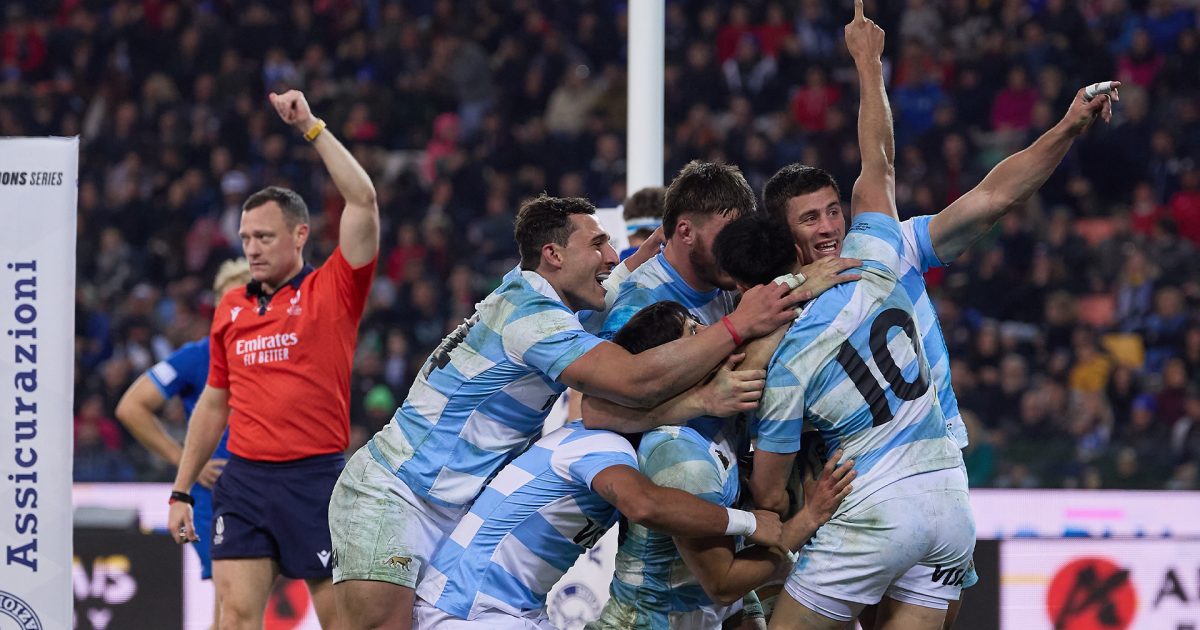
Tomás Albornoz magic sees Argentina run rampant against Italy

It has been debated for a handful of years if Santiago Carreras was the right choice when wearing the number 10 jersey. In a country that had the likes of Hugo Porta, Gonzalo Quesada, Felipe Contepomi in the position and tenants of a number 10 jersey of a different sport such as a certain Diego Maradona and Lionel Messi, who wears that coveted number is quite important.
Santiago Carreras has been a great servant of Argentine rugby and is much loved in Northampton where much of his professional rugby has been played. In saying this, he has played more at fullback than flyhalf at club level. And, it must be stressed, he is a player that has a lot of Test rugby in him. Maybe not at flyhalf, but certainly is an asset in a squad of 23.
When Michael Cheika joined Los Pumas as an advisor, he was convinced, and convinced coach Mario Ledesma, that Carreras was the one to marshal the troops from 10. When he became coach, the Australian was such a fan of Carreras that others were not offered real chances.
Tomás Albornoz had only broken into the Jaguares’ squad when COVID arrived and his opportunities soon dried. He was given a few cameo opportunities but never sufficient time to showcase his value.
Until this year.
Felipe Contepomi was named Pumas’ head coach and even if he fully understood what was needed in the pivotal position, Carreras was first choice until Albornoz was given a real opportunity, which he took it with both hands.
He played the second half in that win in Wellington against the All Blacks and then started against Australia in Santa Fe. Los Pumas won 67-27.
His ability to launch an eager set of backs was as noticeable that day as it was in Udine where Los Pumas beat Italy 50-18 to open their November tour.
He scored the third Argentine try, and was involved in all that was good about Los Pumas’ attack and even showed what he can offer, moving forward, in defense.
Notes from his first-half performance read:
3rd minute – Albornoz penalty
5th, 26th and 38th minute – Albornoz turnovers under deep positional pressure
6th minute – Albornoz launches a deep attack
10th minute – Albornoz goal from a Mallía try
28th minute – Isgró captures a precise high kick from Albornoz, leading to Argentina’s second try
There was a lot more of that in a second half that included his try, born from a well-placed kick and the pressure of his teammates before the ball squirted for him to run some 30 metres to score under the posts.
The solid win for Los Pumas was, of course, much more than an Albornoz one-man show.
The forward pack dominated throughout, with the scrum proving to be a solid platform to attack from, giving forward momentum for the backs to run. The lineout, which brought an easy 73rd-minute try for veteran lock Matías Alemnanno – had the regularity that a top side is after.
Lock Pedro Rubiolo tackled as a flanker, the flankers played as a back and the backs scored five of the seven tries – with winger Santiago Cordero getting a brace.
Whilst he was on the field, scrum-half Gonzalo Bertranou, who is as tidy as he is prudent, gave good, quick, service to ensure that when Albornoz launched attacks that hurt an Italian side that paid a high price for their defensive naivety, unable to stop the momentum generated by Los Pumas.
This loss was the biggest since Gonzalo Quesada took over at the start of the year.
There were a lot of positives to carry on going into a much harder proposition in six days when they play Ireland at the Aviva on Friday.
The Irish will be hurting as hell after their loss against the All Blacks and know that their visitors have a lot of their own IP. Felipe Contepomi is a much-loved son of Leinster where he starred in a golden era and later was assistant coach.
He knows what the Irish are about and some of the trends the men in green do is similar to what Argentina aims to do.
“Ireland is another type of team and it will be a different challenge; we know what we have to do,” said coach Contepomi from the sideline.
“We have a shorter week, we have to travel, so planning is crucial to be in the best possible shape to impose our game plan and to try to have the most favourable result”
The stakes are much higher as is the pressure under which Albornoz, if he starts again, will be under. Carreras, nursing a calf injury, will be available as will Pablo Matera having completed a two-match ban.
Captain Julián Montoya was happy. “It was an incredible game but there are always things that can be corrected,” he said. “We did what we said we wanted to do and we played with the intensity that we had planned.”
“We must enjoy the win; we worked hard to achieve it and we deserved it. It is a short week and we must soon refocus.”
































































































Albornoz pretty much put his name on that Pumas' 10 jersey. What a performance.
Argentina with a shaken-up roster, but still pulverized Italy. They play an intelligent game, too: kicked double the metres than Italy did. They're not just running the ball.
Juani Hernandez also at 10 for Los Pumas... such a great player.